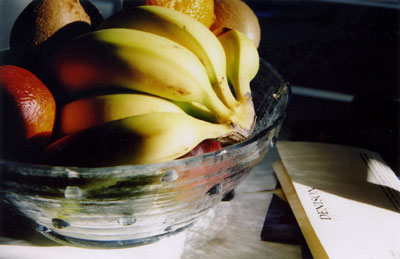All Nonfiction
- Bullying
- Books
- Academic
- Author Interviews
- Celebrity interviews
- College Articles
- College Essays
- Educator of the Year
- Heroes
- Interviews
- Memoir
- Personal Experience
- Sports
- Travel & Culture
All Opinions
- Bullying
- Current Events / Politics
- Discrimination
- Drugs / Alcohol / Smoking
- Entertainment / Celebrities
- Environment
- Love / Relationships
- Movies / Music / TV
- Pop Culture / Trends
- School / College
- Social Issues / Civics
- Spirituality / Religion
- Sports / Hobbies
All Hot Topics
- Bullying
- Community Service
- Environment
- Health
- Letters to the Editor
- Pride & Prejudice
- What Matters
- Back
Summer Guide
- Program Links
- Program Reviews
- Back
College Guide
- College Links
- College Reviews
- College Essays
- College Articles
- Back
Am I a Banana? And Other Identity Crises MAG
There is an epidemic plaguing the nation. It causes millions of Asian Americans to feel as if they are “yellow” on the outside and “white” on the inside. This dichotomy can only be described as musa sapientum fixa languore, or banana disease.
Many Asian Americans who grow up in predominantly white America tend to adopt certain aspects of American culture to better fit in with their Caucasian peers. Listening to American music, watching American movies, or enjoying American sports helps make Asian Americans feel less “other” when hanging out with non-Asian friends. On the contrary, assimilating into American society also causes Asian Americans to lose some contact with their cultural roots. They may participate in fewer of the Asian cultural practices brought over by their parents and become, as many call it, “white-washed.”
If I received a banana for every time I’ve been called “white-washed,” I would have enough to give to every Asian American I know as a friendly, potassium-filled reminder of the identity crisis they’ve probably faced at some point.
I’ve lived in predominantly white towns my whole life. The schools I attended had few Asian kids, so, naturally, most of my friends were white. The movies I watch, the artists I listen to and the places I shop are mostly American. My family speaks English at home, for even though my mother hails from Taipei and flaunts trilingualism in Mandarin, Taiwanese, and English, my father is from Detroit and can only boast fluency in medical terminology.
So how can one blame me for being a bit “white-washed?” I live in an English-speaking household, grew up having mostly Caucasian friends, and am deeply immersed in American culture. These conditions are unequivocally conducive to Stage IV musa sapientum fixa languore. Sometimes it’s easy to forget how sharply my exterior appearance contrasts with my internal “white” feelings.
My Asian friend, “Wendy,” perfectly described this conundrum one day in the restroom. We were scrutinizing our reflections in the mirror, me violently raking my fingers through my hair and Wendy briskly re-styling her ponytail. She suddenly gasped and whispered, “Oh my God. I look so Asian.”
I laughed. “What do you mean?”
“Like, I forgot I was Asian,” Wendy said, peering at her reflection.
Puzzled, I looked at my reflection as well. Though I was not startled by the Asian face staring back, I was taken aback by the fact that I suddenly understood what Wendy meant: being Asian in a 72 percent Caucasian high school means you sometimes have to “forget” that you are Asian in order to fit in.
Banana-ism causes Asian Americans to sometimes feel and “act white” to be socially accepted. This brings about a slew of identity issues. First, Asian Americans still will not be seen as white enough, despite all their efforts; they simply do not look the part. Second, they will not be seen as Asian enough, either. Speaking English with an American accent, raving about the newest Hollywood movies, or proclaiming a love for sweet potato fries does not put one in the highest regard of one’s Asian elders. (Salty? Who me?) The duality of the Asian American identity can make us feel as though we don’t quite belong anywhere.
What can a banana afflicted with musa sapientum fixa languore do? Embrace yo-self. Stop trying to mold yourself into this or that. Recognize that being Asian and American is a gift. It’s okay if you don’t fit perfectly into white society or Asian society because, quite frankly, life is more interesting when you can enjoy aspects of multiple cultures.
You are exposed to languages besides English, which not only allows you to communicate with relatives but helps you make connections in the social and business world. You can participate in your family’s various cultural traditions and gain insight into how people live in other parts of the world. You are exposed to foreign sights, exotic scents, different cuisine, boba. You can experience so much more.
So, friends, remember that it’s okay if you’re called “white-washed” or forget you’re Asian sometimes. These are not permanent conditions, and you are simply finding a way to recognize the American side of your Asian American experience. Espouse the duality; it adds depth to your life.
As for my other multicultural friends, whether you’re a self-proclaimed egg, Oreo, coconut, or whatever, the same rule applies: embrace yo-self. Life is far more interesting when you do.

Similar Articles
JOIN THE DISCUSSION
This article has 2 comments.

2 articles 0 photos 1 comment